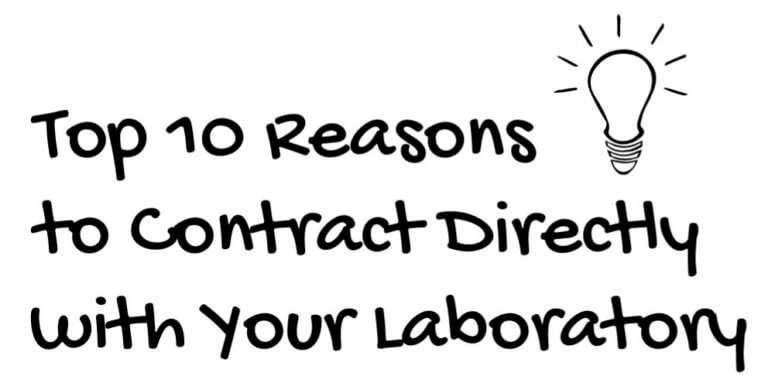As an Industry, here are Top-10 Reasons to Contract Directly with Your Laboratory
An industrial entity with environmental liability is often required to collect samples for compliance or characterization purposes. These samples are typically submitted to a commercial analytical laboratory for select analyses, and the data generated from these analyses become the basis for critical project decision-making. If an unqualified consultant is assigned the important responsibility of selecting the “best” laboratory to provide project analytical services and naively selects a laboratory because it offers the “cheapest” pricing, the project can be compromised. The time and costs associated with trying to defend inferior data and/or re-sampling can be staggering!
Industrial parties should be aware that all laboratories (NELAC accredited or not) are not the same in terms of service, analytical offerings, and data quality. In fact, many analytical methods contain gaps and options that analytical providers use to justify “short cuts” that allow their “bare bones” pricing. Poor laboratory procurement judgment, coupled with the fact that data are usually questioned years after generation, has placed many industrial parties in high-liability situations – defending substandard data when both the responsible consultant and his/her contracted laboratory are no longer in the picture.
Environmental Standards’ Quality Assurance Chemists/Specialists, who have contracted for analytical services on behalf of many industrial parties and who have conducted almost 800 on-site laboratory audits, have developed a Top-10 List of Reasons (technical and business) why industrial parties should contract directly with their analytical service providers.
Number I0: Your consultant does not learn analytical jargon on your dime. Properly designed and executed direct contracting will virtually eliminate ineffective and costly communications between the consultant and the laboratory.
Number 9: You receive superior service from the laboratory because your company is an important client. Your company (not your consultant) will be associated with the laboratory’s revenue, and the laboratory will be more responsive. If there are questions about the analysis or the data, the laboratory will communicate directly with you, thereby allowing for more timely decision-making and precluding miscommunication via a third party.
Number 8: You do not pay the consultant mark-up. Many industrial parties pay in excess of $3M/year in analytical costs (often reflected as line items on their consultants’ invoices). A consultant typically has a 5-15% pass-through charge for a laboratory subcontract (quite substantial for $3M/year).
Number 7: You can reduce company analytical services costs through consolidated purchasing power. An industrial party can realize up to a 30% annual cost savings by contracting for comprehensive analytical services.
Number 6: You can receive advice and insight from qualified Chemists (your laboratory vendors). Analytical method questions and issues can be addressed by laboratory Chemists who know the limitations and the pros/cons of the methods.
Number 5: You can establish performance metrics for your consultants. Project consultants and laboratories often blame each other for project problems. For example, poor planning by a consultant is often attributed to laboratory inefficiencies; under contract to the consultant, the laboratory cannot reveal the “root cause” of the problem to you. This scenario usually results in your company funding a re-sampling event. Direct contracting makes both the consultant and the laboratory accountable to you.
Number 4: You can establish Laboratory Technical Requirements to monitor data quality. Company-specific technical requirements provide a mechanism and a benchmark by which data quality and laboratory performance can be measured (e.g., on-site audits, single-blind and double-blind performance evaluation studies, and rigorous data validation).
Number 3: You can control the quality of the analyses. An industrial party that may be using up to 50 separate laboratories (through consultants) to provide analytical services for its various environmental projects can mandate the quality of data generated and ensure data comparability among contracted laboratories by including rigorous technical requirements in the laboratory contracts.
Number 2: You retain contractual ownership of the data. If your consultant pays laboratory invoices on your behalf, the laboratory (if still in business) is not obligated to provide your company any information whatsoever (especially, years after project data have been generated).
And … Number 1: You can manage your liability. Your company has the ultimate liability – not the laboratory, and not the consultant. You will be in a position to work with your contracted laboratory to address any data quality or defensibility issues that may develop.
Interested in learning more about Environmental Standards direct laboratory sourcing, contract management and quality oversight programs? Call Rock J. Vitale, CEAC, Technical Director at 610.935.5577.


